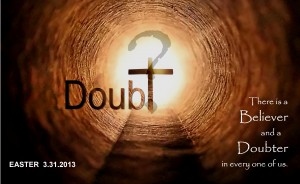 Within the body of Christ, an often unspoken, and at times, an emphatically spoken commandment is, “Thou shalt not doubt,” or, “God said it, just believe it, and that settles it.” Sad to say, this type of reaction to someone who is searching for answers to their questions about the truth claims of the Christian worldview, whether Christian or non-Christian, has turned many away from the truth of Christianity, and this reaction to a seeking individual happens all to often.
Within the body of Christ, an often unspoken, and at times, an emphatically spoken commandment is, “Thou shalt not doubt,” or, “God said it, just believe it, and that settles it.” Sad to say, this type of reaction to someone who is searching for answers to their questions about the truth claims of the Christian worldview, whether Christian or non-Christian, has turned many away from the truth of Christianity, and this reaction to a seeking individual happens all to often.
Let’s consider first, the dictionary definition for doubt:
to be uncertain about something;
be undecided in opinion or belief;
a feeling of uncertainty about the truth, reality, or nature of something.
Haven’t we all felt ‘uncertain’ or ‘undecided,’ even about the truth, reality or the nature of something? I know I have. However, it was this ‘uncertainty’ or doubt that drove me to investigate a particular truth claim and thus come to a conviction and belief that the truth claim was indeed true. This brought me to the place where I not only believed something to be true, but I knew why I believed it to be true. Or, if it was false, I would come to a knowledge and conviction that is was indeed false. When a doubt or an uncertainty about a particular aspect of my faith presents itself, I always try to first, take it to the Lord in prayer, asking Him to lead and guide me in my search for the truth, and then I dig in via the investigative process of meditating on the particular passage or truth claim, researching commentaries, books, etc., from trustworthy/notable theologians and scholars on that particular subject. I can say that in every case so far, my uncertainty/doubt has been alleviated and my faith has grown stronger. As Christian minister Lynn Anderson has said, “A faith that’s challenged by adversity or tough questions…is often a stronger faith in the end.”[1]
In the New Testament, the Greek word for doubt is Diakrinō which has several definitions:
- to separate, make a distinction, discriminate, to prefer
- to learn by discrimination, to try, decide
- to determine, give judgment, decide a dispute
- to withdraw from one, desert
- to separate one’s self in a hostile spirit, to oppose, strive with dispute, contend
- to be at variance with one’s self, hesitate, doubt
-
I found it striking that the first and most common definitions were those with a particular focus on an investigative, discerning process–to separate, make a distinction, to prefer, to learn by discrimination, to try, decide, give judgement. As I mentioned above regarding my own experience with doubts, I have found that I can use them as a catalyst toward a stronger and robust faith via prayer, study and research. As Paul said, “test everything; hold fast what is good. (1 Thessalonians 5:21), which is a part of “loving God with all our mind.”
As Christians we are commanded to “always be ready to make a defense to anyone who asks you for a reason for the hope that is in you, yet do so with gentleness and respect.” (1 Peter 3:15) This means that we should not only be prepared to answer challenges to the Christian worldview from non-Christians, but we should also be ready/prepared to offer the same answers to a brother or sister in Christ who is struggling with doubts, whether they be intellectual or emotional, doing so with “gentleness and respect.” As Jude 1:22 commends us to, “have mercy on those who doubt.” Jesus’ own example is one that we can take to heart and apply here. As He came down the mountain, Jesus was met by a large crowd of people. A father had brought his demon-possessed son to Jesus’ disciples, but they were not able to cast the demon out. In desperation the father pleaded with Jesus, “If You can do anything, take pity on us and help us!” Jesus answered, “If You can! All things are possible to him who believes.” The father responded, “I do believe; help my unbelief.” Can you identify with the father in this story? I know I can. Oftentimes as Christians we find that our faith is in precisely the same state as this father’s. We genuinely believe, but we need help with our unbelief. It’s always been an encouragement to me that after the father’s admission of a faith mixed with doubt, Jesus nonetheless cast out the demon and healed the man’s son.
But the question is this–are we, each of us as individual Christians and members of the body of Christ, prepared and ready to be that ‘staff’ that others can lean on and come to in their hour of struggle with doubt? Are we prepared to meet the challenge of doubt, whether it comes from outside the church or from within? Charlie Campbell puts forth the following challenge to each of us:
“Can you imagine being an ambassador for your country and neglecting to prepare yourself for the common questions that people ask about your homeland? That would be irresponsible. You’d be without a job very quickly. God tells us that we are His ambassadors (2 Cor. 5:20). Seeing that that is the case, I think it is important that every Christian consider the following question: Am I ready to answer the common questions people ask about God? Am I ready to explain to someone why I believe the Bible is trustworthy? 1 Peter 3:15 says that we are to be ready to give a defense of our faith. Are you ready? Sadly, many Christians watch more TV in a week than they’ll spend in a year preparing themselves to answer questions about God and the Bible. Don’t leave defending the faith to your pastor. The church needs an army of saints who are able to articulate the truth persuasively and graciously. We are all called to “contend earnestly for the faith” (Jude 3).[2]
It is up to us, yes, each one of us, to equip ourselves as ambassadors for Christ and His Kingdom that we may lead others out of the dark valley of doubt, through love and compassion, and into the marvelous light of God’s truth–“I am the Way, the Truth and the Life.” (John 14:6)
How Can a Christian Deal with Doubt?–Os Guinness
Dealing with Doubts–William Lane Craig
Is it Ok to Question the Bible?
Resource:
Dealing with Doubt in Our Christian Faith
https://www.probe.org/dealing-with-doubt/
Footnote:
1 Lynn Anderson, interviewed in Lee Strobel, The Case for Faith, 322








